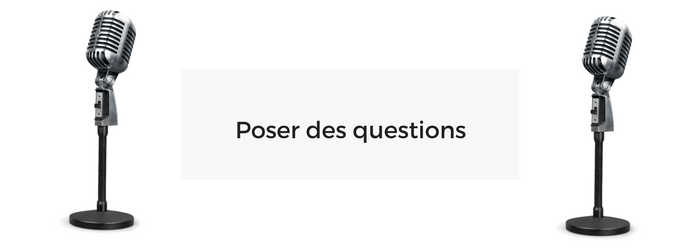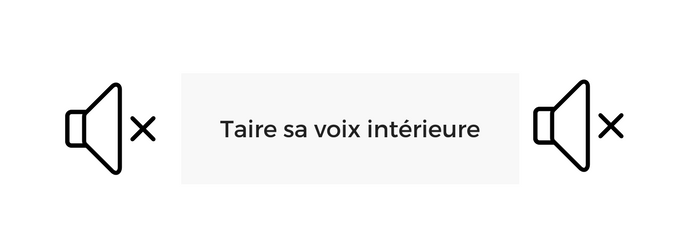Improving your listening skills will have an overall impact on improving your communication. When you communicate, you want to be understood and the other person wants to be listened to. The facts are there! How many of you really feel listened to? How many of you would benefit from improving your listening?
Communication is a link between two people and listening is fundamental to forging this bond.
This article offers you 3 ways to improve your listening skills as well as the barriers to listening.
 #1 To improve your listening… You have to ask questions
#1 To improve your listening… You have to ask questions
The idea here is to understand the other person’s words and to get them to clarify their thoughts or simply to allow them to express themselves.
In listening mode, the other person is more important than us.
So, what kinds of questions should be asked?
Open-ended questions help you listen
Asking an open-ended question means that the answer to that question cannot be yes or no. Why is that? Simply to avoid inducing a response.
For example, you’re with a friend by a lake and you’re wondering, “Are you cold?”
Think. We often ask questions about topics that are of personal concern to us. If I start to feel cold or if this friend has already told me that he was cold near the lake, I may tend to ask a question referring to this memory… “Are you cold?”
There is no fundamental problem with this, simply here it is a matter of seeing that most of the time we are talking about ourselves and/or a past experience, rather than making a connection in the present.
In other words, I invite you to stay in the present of the situation, without preconceptions, and to ask open-ended questions to connect with the other. In the previous situation, a “Are you cold?” can turn into “How do you feel?” This last question provides several answer options and can lead in completely different directions. You’ll have a completely different conversation, right?
Not inducing a response will allow you to connect with each other differently.
An open-ended question starts with words like: how, what/who, to what extent, what do you think of, etc.
Use the same vocabulary as the other
Improving your listening means prioritizing the other person’s words over your own. Using the same words as the other person allows him to continue to express himself and clarify his thoughts.
Like what:
- I don’t think it will be possible to deliver the project on time.
- In time…? What do you mean?
- We were supposed to deliver by the end of the week and there are pitfalls.
- What are the pitfalls? (Compared to naming all the possible pitfalls or jumping to conclusions!)
- Among other things , the supplier will not be able to deliver.
- What else? (Compared to railing at the supplier or looking for the culprits.)
- The team has a technical problem.
- Knowing that we have a delivery date imperative, what do you offer? (Compared to giving the solution, lecturing or being directive, we seek here to empower the other and to work together.)
Therefore, it’s up to you to ask more questions!
Some questions may require courage!
Courage is part of listening! When an answer is not directed, we can expect a wide range of results!
 #2 To improve your listening… you have to shut up your little voice
#2 To improve your listening… you have to shut up your little voice
Try to notice that every time someone says something to you, you respond. Even if it’s not a question, you give your opinion, reassure yourself, etc. in short, you answer rather than try to understand!
We often bring everything back to ourselves.
Example: I came back from vacation and I said to my colleague: The vacation was great! The colleague thinks he needs a vacation. He has the choice to switch to listening mode or not.
- Without listening: Ah! That I need a vacation!
- With listening: Oh yes? What did you do?
Example: my boss asks me to deliver an urgent file and I tell my colleague: I’m working on an urgent file! The colleague becomes frustrated, because he is also working on an urgent file. He has the choice to switch to listening mode or not.
- No listening: It’s always like this here, priorities change all the time!
- Listening: An urgent file… talk to me about it!
The inner voice is what brings us back to ourselves, it is what we say to ourselves internally. It is impossible to silence this voice. However, what you can do is pause it while you listen to the other person. Don’t get into an internal debate to silence her, you will give her all the attention 😉
To have all the tools you need to develop powerful listening skills and ask effective questions, watch the Communicate differently online training.
 #3 To improve your listening… We often have to remain silent
#3 To improve your listening… We often have to remain silent
The simplest is often the hardest!
You asked one question and the other one said: I don’t know! or even answers nothing… ABOVE ALL, DON’T SAY ANYTHING! Don’t answer for him, don’t fill the void and you’ll see… After a few seconds, something magical will happen: an answer!
Your role is to listen, not to guess.
So, give it time. Hold on. Some answers can be difficult to articulate and it may take a while for the person to think about their answer and say it in the right words for them.
Silence is often the best tool for listening.
Barriers to listening
The following barriers are not trivial. I invite you to watch yourself when you are going to use one in the near future. They cut off communication altogether. A person who needs to be listened to does not want to be judged, told what to do or even have the other person talk only about him! She simply wants to be listened to, so here are the most frequent barriers:
- Judging or criticizing.
- To moralize.
- Giving unsolicited advice.
- Try to convince the other person of his or her point of view.
- Say that it’s not serious, not important, that it will pass (minimize what the other person is trying to tell us)
- Tell how *we* are better.
Conclusion: How to improve your listening skills
To conclude, you have probably already read the quote: we do not listen to understand, but to respond. Well, it often is! Listening is about leaving room for the other, questioning them, using their words to allow them to deepen their reflection, to clarify their thoughts.
It can be very difficult to tune out your voice and everything that the other person triggers in us when they talk to us, the trick is to put that aside while you talk. You’ll have plenty of time to express yourself afterwards!
Practice keeping silent… And just that, will make all the difference.
Find out more about how listening and relevant questions can help you perform at your best while helping and feeling energized, read the article ” How to find balance: coaching your team while conserving energy “.

 #1 To improve your listening… You have to ask questions
#1 To improve your listening… You have to ask questions #2 To improve your listening… you have to shut up your little voice
#2 To improve your listening… you have to shut up your little voice #3 To improve your listening… We often have to remain silent
#3 To improve your listening… We often have to remain silent


